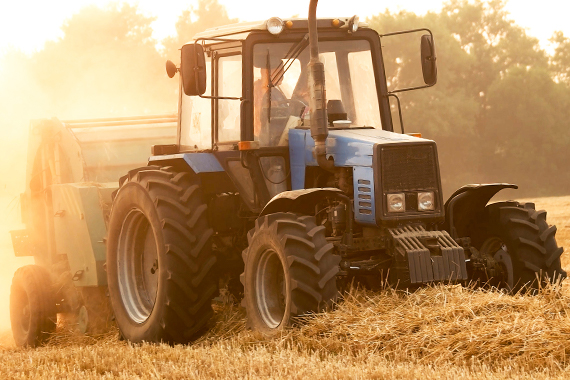
How farm finance can help you save money when you get the basic knowledge before applying for agricultural finance.

The agricultural industry is subject to more stress from external factors than almost any other; in addition to the economic factors of supply and demand, farmers are also at the mercy of the UK’s changeable weather. While one year might produce a bumper crop the next might be a total failure, and there are very few certainties that farmers can count on.
With this in mind it’s vital that farmers have some way to counteract the annual fluctuations in their farm’s profitability, and being able to access a flexible and specialised form of finance is invaluable for those in the agricultural sector. Farm finance is a key part of any farmer’s year-to-year strategy, and without a stable backup plan that can provide cash when it’s needed farms are in a very precarious position.
While farm finance might be a necessity, farmers should be careful to understand precisely what the terms and conditions of these loans are. Although many farm finance specialists are able to provide highly tailored solutions that mirror the needs of their clients, not all loans are suitable for every situation. Therefore, farmers should seek the counsel of a professional financial advisor before committing to a financial product of any type, in order to ensure it’s appropriate for their circumstances.
As we’ve already mentioned, farmers are exposed to a multitude of factors that can place stress on their finances. Farmers know that they can’t necessarily count on a future harvest as money in the bank - while they may have made a big profit one year, they may struggle to match this with their next harvest. Because they’ll still have to meet a lot of expenses even if they have a poor year, farmers need to keep enough money on hand to pay wages and invest in more seed and livestock, but this prevents them from investing in expanding their farm. Money tied down to protect against a bad year is money that could be spent on new equipment, new land and other income-generating investments.
This is why agricultural finance can be such a useful tool for farmers: it reduces their obligation to keep cash on hand “just in case”, and lets them invest profits as and when they wish. Because farmers are able to source the finances they need from specialist lenders they no longer have to be exceptionally cautious in their spending, and can afford to take on opportunities that they might otherwise need to forego.
Agricultural lenders provide a wide range of solutions for farmers. Since they offer specialised products to farmers, the types of finance they provide can be put towards many of the most common uses on a farm, which can include:
Purchasing land: for pastoral and arable farmers alike the key ingredient for profit is land. The larger a farm is, the larger the profits it can produce, and the more weight it has in negotiations with big-name buyers. The ability to purchase land as and when it comes to the market is vital, and specialist loans for land purchase can help farmers to raise the money to buy additional fields.
New equipment and assets: Purchasing a new silo or replacing the old tractor can be an expensive business, but by using farm finance farmers can spread the cost of these large one-off expenses across many months. This reduces the impact on the farmer’s income, and helps them to meet daily running costs - it also enables them to purchase vital equipment at short notice.
Diversification: Farmers are often heavily committed to a specific crop or type of livestock, which leaves them exposed to fluctuations in the market and to organic factors such as breed-specific diseases. Diversifying is a good way to improve a farm’s resilience; opening a farm shop, for instance, can help by providing an additional income stream. The capital to finance diversification can usually be obtained through a specialist farm finance lender, with terms that can be adapted to suit the farm’s particular needs.
Green Energy and Eco-Fuel: One important way in which farmers can generate income from their land is by investing in alternative fuel and energy sources. By dedicating space to solar energy generators, wind towers and biofuel production farmers can offset the overhead costs of running their farm, and can even turn a profit. Best of all, energy and fuel generation can run year-round, helping to provide an income during the winter months. Specialised loans to help farmers invest in green technology can be obtained from many specialised agricultural finance providers.
Recovery and Restructuring: After a bad year, a farm might struggle to get back on its feet. The costs of re-sowing fields and purchasing new livestock can be high, and without the capital to invest in the next year’s crop it’s tough for a farm to start the ball rolling again. Specialist recovery loans can be obtained in order to finance a farm that’s starting over again, and it’s often possible to restructure the farm into a more profitable format as well; by consolidating debt and eliminating unprofitable elements a farm can go from famine to feast in a surprisingly short space of time.
As with many forms of specialised lending, there are an enormous number of variations on a typical farm finance loan. Each individual lender will have its own specialities and preferences, and will offer different terms and conditions to their clients. A few of the most important aspects for farmers to pay attention to are:
Security: Is the loan secured against assets, or is it a personal loan? Generally speaking, an asset-backed loan can be of a higher value and is cheaper overall, but if it’s not repaid the lender can take possession of the asset used to secure it.
Interest: How much is the interest, and when will it be paid? Some lenders allow farmers to “roll up” interest until the end of the loan, rather than paying it off each month, which can be very handy for keeping running costs down.
Loan term: How long will the loan be for? Lenders are generally quite flexible on this, but be sure that you’ll be able to repay the loan by the time it becomes due.
A bridging loan is a short-term loan secured against property. It allows you or your business to “bridge a gap” until either longer-term finance can be arranged, or the underlying security or other assets can be sold.
There are many ways in which businesses can use a commercial bridging loan. Common uses are to cover short-term cashflow issues or to finance tax liabilities. More positively they can be used as working capital and by new businesses as a cashflow injection to acquire additional stock or even to acquire new equipment or premises for the business. Beyond these examples there are a huge variety of ways in which commercial bridging loans can be used.
Yes. Whilst not as widely available as 1st Charges some lenders will happily write 2nd charge commercial bridging loans.